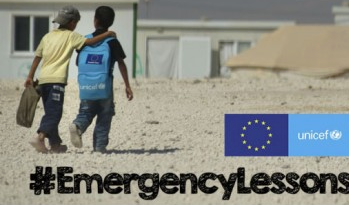UNICEF and the EU team up to reaffirm children’s rights to education in crisis zones
Education for children affected by emergencies is about to receive greater focus as the United Nations Children's Fund and the European Union launch a social media-driven public awareness campaign set on reaching 20 million Europeans.

By launching the #EmergencyLessons campaign on education in crisis zones, the United Nations Children's Fund (UNICEF) and the European Union (EU) are specifically targeting people 25 and under in Greece, Hungary, Ireland, Italy, Slovenia, Slovakia and the United Kingdom. They want to inspire young people to raise their voices on behalf of millions of children and adolescents whose education has been interrupted by emergencies.
Staggering statistics
Nearly one in four of the world's school-age children – 462 million – now live in 35 countries affected by crises, including an estimated 75 million children who are in desperate need of educational support, UNICEF stressed.
Apart from missing out on education and the benefits it yields for them and for their societies, out-of-school children are more vulnerable to abuse, exploitation and recruitment by armed forces, the agency said.
The campaign underlines that education is as critical as food and medicine for children living through and in the aftermath of emergencies. It draws on the real-life experiences of children living through emergencies in countries such as Guinea, Iraq, Nepal, and Ukraine. During the next seven months, their stories will be shared on social media through #EmergencyLessons.
Safe Schools Declaration and more
This new campaign mirrors Education International (EI)’s views in its promotion of widespread ratification of an international Safe Schools Declaration.This Declaration commits signatory states to protect education by improving the monitoring and reporting of attacks, assisting victims, investigating attacks, prosecuting perpetrators, and introducing conflict sensitive approaches to education.
These are some of the measures recommended in the Global Coalition to Protect Education from Attack report, Education under Attack 2014. The Declaration also commits states to endorse and use the Guidelines for protecting schools and universities from military use during armed conflict.
The 7th EI World Congress held in July 2015 in Ottawa, Canada, with the adoption of the Resolution on education, peace and justice in conflict areas, also instructed the EI Executive Board to urge affiliates to press their governments to adopt and endorse the guidelines.
Source: Education International
- 328 reads
Human Rights
Ringing FOWPAL’s Peace Bell for the World:Nobel Peace Prize Laureates’ Visions and Actions

Protecting the World’s Cultural Diversity for a Sustainable Future

The Peace Bell Resonates at the 27th Eurasian Economic Summit

Declaration of World Day of the Power of Hope Endorsed by People in 158 Nations

Puppet Show I International Friendship Day 2020

